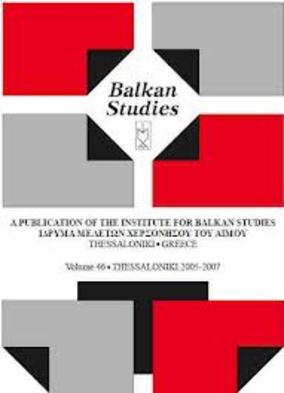La politique culturelle francaise vis-a-vis des etats Balkaniques dans l'entre-deux-guerres
Part of : Balkan studies : biannual publication of the Institute for Balkan Studies ; Vol.29, No.1, 1988, pages 143-159
Issue:
Pages:
143-159
Parallel Title:
France's cultural policy in the Balkan States during the interwar years
Section Title:
Articles
Author:
Abstract:
This is the first approach to a study of France’s cultural policy in theBalkan States during the interwar years.First, we present the essential features of France’s cultural presenceduring this particular span of time. It was very strongly marked by the teachingof French language and civilisation which had been initiated at the endof the 19th and the beginning of the 20th century. In this part of the world^France’s cultural presence was organised through various primary and secondaryeducational institutions : religious orders, secondary schools, “Instituts Français” belonging to the French Foreign Office (“Service des oeuvresfrançaises à l’Etranger”), “Alliance Française”, “Sociétés des Amis de laFrance” and institutions under the “Mission Laïque Française”.During this period, and particularly in the thirties, this cultural presenceincreasingly rooted itself in the reality of the rivalry opposing European Powersin Central Europe and the Balkans, and the growing importance of thefascist powers.This rivalry can be seen in the development of cultural activities, andeven of “propaganda”, especially from Italy and Germany.The study shows that from 1930 to 1935 France neglected to intensify theuse of the cultural component in her foreign policy, and limited herself tothe preservation of what already existed.As from the autumn of 1936 there was a growing awareness of this fact,after which the situation was rectified. From then onwards it becomes possibleto speak of a dynamic, aggressive, structured cultural policy with increasedmeans conducted by the various governments until the War. Thiscultural policy then became a weapon with which to safeguard peace and atthe same time a defence instrument of French power, more obviously thanduring the previous years.In this study we show the means used to accomplish this recovery : massivedonations of French books to universities and libraries; stronger presencein the universities and in scientific circles; search for influence in theprovinces and in broader social layers; use of broadcasting and cinema.The study mentions three examples of “nationalistic” resistance in countriestrying to build their own national identity facing the French culturalpresence. In Greece, in January 1931, the Act of Reform of Primary Education—the Papandreou Act; in Bulgaria the denunciation in the spring of1939 of the French-Bulgarian School-Convention, and the same year in Yugoslaviagrowing difficulties. A quick appraisal shows, however, that on theeve of the War there was a considerable improvement of the French culturalpresence in the Balkans. As a token of this desire for balance in inter-Europeanrelationships, we should mention particularly the signing of culturalagreements in December 1938 with Greece and March 1939 with Romania.The conclusion stresses the twofold evolution ol the French culturalpresence in the Balkan States during these 20 years. This presence was notonly literary and humanistic, it was also that of industrial France with hermodern technology.Within the context of European tensions, the French cultural presencebecame a full instrument of France’s foreign policy: “information” and “culture” pursued the same goal, i.e. to maintain French influence and tosafeguard peace.
Subject:
Subject (LC):
Keywords:
Γαλλική πολιτική
Notes:
Το άρθρο αποτελεί μέρος πρακτικών του ελληνογαλλικού συμποσίου που πραγματοποιήθηκε στη Θεσσαλονίκη την περίοδο 15-17 Οκτωβρίου 1987 με τίτλο «La France, la Grece et les Balkansdans les annees trente».




